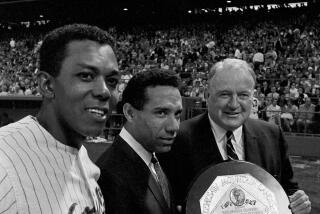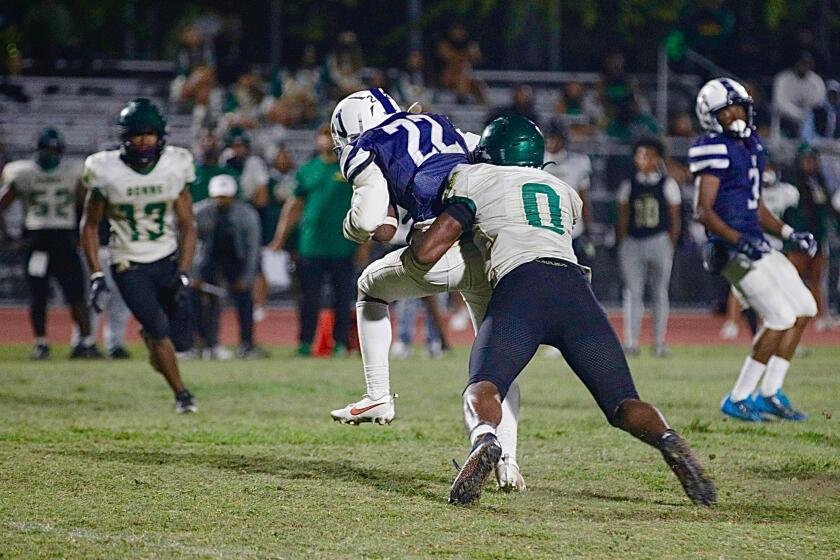COMMENTARY : Memories That Are Frozen in Time
Iâm not so sure Cecil Travis doesnât belong in the Hall of Fame. He was just as good a hitter as John Olerud is today, only he did it longer. But in World War II, he got frozen feet and his career went boom. --TED WILLIAMS, October 1994
*
Christmas, 1944, was cold.
Cecil Travis knows that much.
As to where he was, he had no idea then and has none now. It was Belgium somewhere. He went where they told him. The winds of a winter war blew hard on soldiers lost in the cold.
They might find a barn for the night. Usually they gouged a hole out of the snow and fell in. A manâs feet turn black when they freeze. They swell until they wonât come out of their boots.
Fifty winters later, Cecil Travis sits at home, warm, his feet up on a stool. Down a gentle slope falling away from his house in the woods, there is a pond with a flat-bottom boat pulled half out. A rickety pier needs repair.
Once or twice a day the old man walks the half-mile to his mailbox by the county road. He walks along the curving lane he cut past the pond and between trees on land where he once plowed behind mules to plant cotton for his father. Itâs Georgia land by a little town named Riverdale.
On this day so long after Belgium, black and white cows move over the thick grass of land once covered by cotton. Cecil Travis sits in an easy chair looking at the pond. A ripple of water flashes gold in the afternoon sun.
In the old man you can see the kid shortstop who knew Ted Williams. Heâs wearing blue jeans and a ball cap. He is thin and strong and clear eyed. When he talks vigorously about how small a ballplayerâs glove was in his day, he raises his left hand with the fingers curved as if ready to take a ground ball. And then that hand moves back a half-inch or so, a shortstopâs soft hands even at 81.
Cecil Travis can tell you about the first day he walked into a big league ballpark: âIt was the middle of May, 1933. Ossie Bluege had gotten hurt, so the Senators needed an infielder in a hurry. I was in Chattanooga when they called and said get on a train to Washington right now.
âI was 18 years old. The train took all night to get from Chattanooga to Washington. I got there at 12:30 and went straight to the ballpark.
âI guess I didnât have time to get scared. When I got there, they were already taking batting practice. Somebody said, âYouâre playing today.â â
The kid shortstop straight off the train had five hits in seven at-bats against Cleveland. He thinks the score was 13-12, doesnât remember who won, thinks it might have been extra innings. When Bluegeâs injury healed, the kid took a train back to Chattanooga.
In the years 1934 through â41, the shortstops Joe Cronin and Luke Appling built the heart of careers that put them in the Hall of Fame.
In those years, Cronin hit .300 and Appling .326.
Cecil Travis hit .327.
He didnât cover as much ground as those men did; his legs were never good after injuries in Chattanooga. âKnots,â he says. He moves his hands across both thighs. âI can still feel the knots in the muscles.â
But he always hit. Shirley Povich, the Washington sportswriter in the Hall of Fame himself, said, âWhat a sweetheart Cecil Travis was, a kind and modest gentleman. A left-handed hitter, slapped at the ball, used the whole ballpark. Everyone said, âLucky hitter, lucky.â Heâd get five hits and theyâd say, âLucky.â He was âluckyâ for 10 years.â
In the 1930s baseball teams rode trains from the Atlantic to the Mississippi. Men slept in berths narrower than their bodies and woke covered by coal dust that blew in through windows left open in hopes of relieving the summer heatâs oppression. All these years later, Cecil Travis can hear the persistent warnings of the trainâs bell as it came to crossings. âSoot and clang-clang is what I remember,â he says.
He walked on fields with Babe Ruth and Lou Gehrig, Charlie Gehringer and Lefty Grove and Ted Williams. âTed was always talking, asking about pitchers: âWhat they throwing you, Cecil?â âHowâs so-and-so looking?ââ
In 1941 Williams hit .406. Joe DiMaggioâs 1941 came with the 56-game hitting streak. It was Cecil Travis who led the league in hits, 218. He had the seasonâs second highest average, .359, and was the shortstop on The Sporting Newsâ major league All-Star team.
How little things change history: With one out in the ninth inning of the 1941 All-Star game, Cecil Travis slid into second baseman Billy Herman and broke up a double play on a DiMaggio ground ball that would have ended the game. The next batter, Ted Williams, hit a three-run home run to win it, 7-5. Ed Linn later wrote, âIt isnât possible to conceive of the Golden Age of baseball without Ted Williamsâ home run . . . â
On December 7, 1941, Cecil Travis went hunting. By January he was in the Army. It was four years before he came back to baseball. In â46 he hit .252. The next year his career had gone boom.
Frozen feet, yes. âDurn cold, whew,â he says. âBut that didnât have anything to do with it.â Other men lost legs and feet and lives. He lost only the edge of youth. âYou didnât have to be off but just a hair and you couldnât play.â
He came back to the farm, happy to have done his duty, happy to have had his good years in baseball. And on a warm winter day in 1994, Cecil Travis remembers with a laugh how he worked on his hitting as a kid: âInstead of chopping cotton, Iâd pick up rocks and whack âem with my hoe.â
He hitches a ride through the woods to the county road. There he picks up his mail. And he walks back home on the land he once plowed.
More to Read
Go beyond the scoreboard
Get the latest on L.A.'s teams in the daily Sports Report newsletter.
You may occasionally receive promotional content from the Los Angeles Times.










